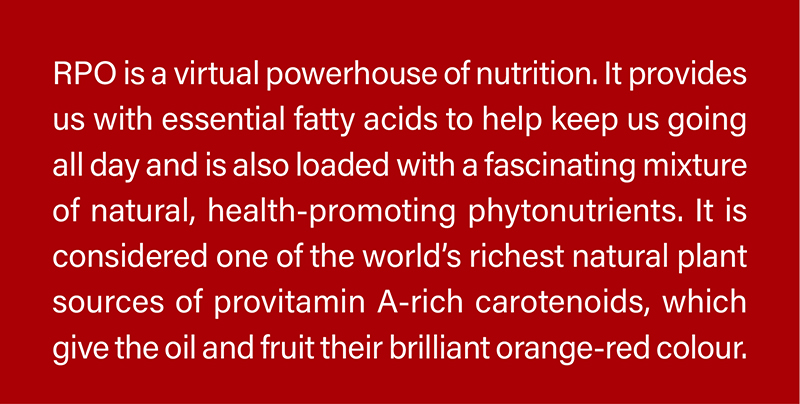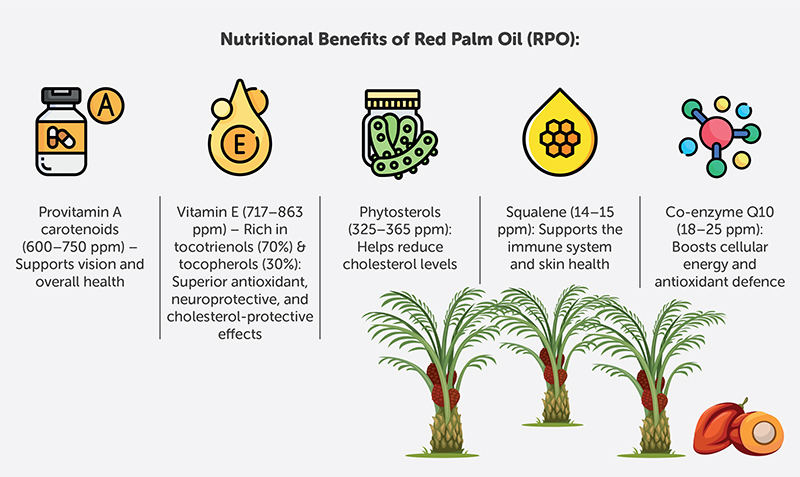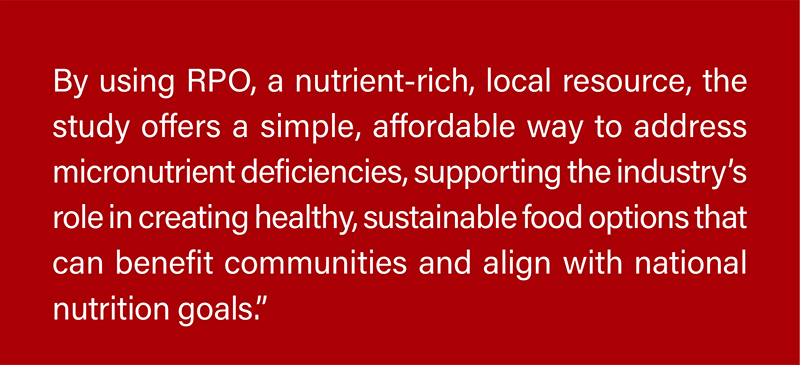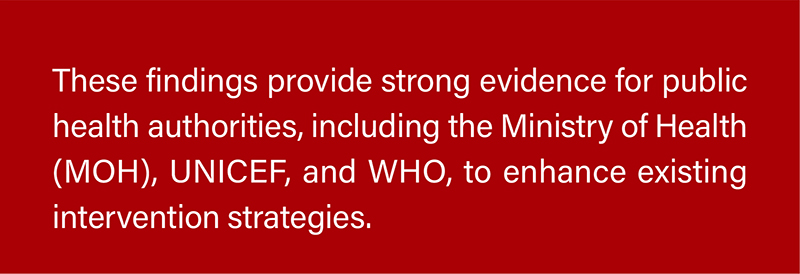From Classroom Snacks to Better Health: New Evidence on the Benefits of Red Palm Oil
A comprehensive Malaysian study reveals how red palm oil (RPO), when fortified into everyday snacks like biscuits, can play a pivotal role in addressing vitamin A deficiency among children.

RPO-enriched biscuits, offered in schools, help boost vitamin A and iron levels in children within six months.
A large nutritional study in Southeast Asia, called SEANUTS (Southeast Asian Nutrition Surveys), revealed that vitamin A deficiency persisted among Malaysian children. The study showed a higher prevalence of 6.4% in rural areas, with even higher rates among Orang Asli (Indigenous) communities. Other studies like Ngah et al. (2002) reported 82.2% of 213 Orang Asli children at Pos Piah, Sungai Siput Utara, Perak, Malaysia, showed ocular signs of vitamin A deficiency (e.g., night blindness to corneal scars) and Al-Mekhlafi et al. (2010) found 27.4% of 214 Orang Asli children at Pos Betau, Kuala Lipis, Pahang, Malaysia, with low serum retinol levels (<0.7 umol/L) - a threshold where vitamin A deficiency becomes a public health concern if >20% of a population is affected. Despite vitamin A deficiency being classified as mild nationally, its severity and potential underreporting among undernourished rural children highlight a critical research gap, as overall data on vitamin A deficiency prevalence in Malaysia remain scarce.
*For access to the full paper. Click here!
Supplementing red palm oil (RPO) for vitamin A deficiency has been extensively studied among children, pregnant and lactating mothers. Numerous research studies following red palm oil supplementation from South Africa, India, Indonesia, and China have documented:
- Significant rise in serum retinol (vitamin A) levels
- Improvement in the ocular signs of vitamin A deficiency
- Increase in haemoglobin
- Improvement in body height and weight
This inspired a group of researchers led by the Malaysian Palm Oil Board (MPOB) to conduct a similar trial in a Malaysian setting. The study focused on rural Malaysian national primary schools across five states.


Red palm oil is one of nature’s richest sources of provitamin A carotenoids, vitamin E, CoQ10, and phytosterols.

Oral supplementation with preformed vitamin A is a primary approach to combat vitamin A deficiency (VAD). Still, its effectiveness in children with consistently low dietary intake lasts only about three months, underlining the need for sustainable, food-based solutions such as fortification, multi-micronutrient powders, biofortification through selective breeding, and dietary diversification. Excessive intake of preformed vitamin A can lead to hypervitaminosis A or toxicity. This risk is significantly reduced with provitamin A-rich foods, which the body converts to vitamin A as needed. In this context, fortifying biscuits with natural red palm olein, rich in provitamin A carotenoids, offers a promising strategy to address vitamin A deficiency in children.
Supplementation using biscuits is one of the most effective and practical food vehicles for micronutrient-fortified feeding among primary schoolchildren, due to its high acceptability, as biscuits are considered a snack rather than a meal. Additionally, they require no preparation, are easily distributed and monitored, and have a long shelf life. As a locally sourced and sustainable ingredient, RPO can be a cost-effective method to support food-based public health strategies. With a long shelf life and suitability for mass production, these biscuits offer an efficient way to deliver essential nutrients to vulnerable populations.

Using locally produced RPO as a food fortificant highlights the palm oil industry’s role in advancing public health.
The supplementation of RPO-enriched biscuits significantly improved vitamin A and iron absorption in children, primarily due to their high ?-carotene content, which enhanced iron bioavailability from the daily diet, making iron easier for absorption Over six months, subjects receiving RPO-enriched biscuits showed notable improvements in serum iron status, along with significant increases in key blood health parameters (hematological parameters such as Hb, PCV, MCV, and MCH), and a marked reduction in microcytic anemia, a type of anemia where the red blood cells are of abnormal sizes. These outcomes suggest that supplementing RPO-enriched biscuits may have beneficial effects on red blood cell production. Additionally, biscuits enriched with RPO have also been shown to exhibit potential anti-inflammatory effects, prevent the development of dry eyes or night blindness, and lower roundworm reinfection, which may be attributed to its high phytonutrient content.
This research shows that RPO-enriched biscuits could effectively improve the health status of vitamin A-deficient children, highlighting palm oil potential in improving public health concerns.


Micronutrient delivery, especially in rural and remote communities, can be significantly improved by incorporating RPO-enriched foods into large-scale fortification initiatives.
The children enjoyed the RPO-enriched biscuits, offered in four flavours four days a week, making them a well-received snack. Some schools noted improvements in the students’ energy levels and focus, with some even requesting additional biscuits for their preschool children. A number of school headmasters expressed enthusiasm for transforming the trial into a long-term supplementation programme, reflecting a desire for sustained nutritional support beyond the research scope. Overall, the positive responses from children, teachers, and parents underscored the biscuits’ acceptability and perceived impact, reinforcing the intervention’s success and community support.
The demonstrated health benefits of red palm olein in this study position it as a valuable food fortificant for integration into national nutrition programmes targeting vitamin A deficiency and malnutrition.

By incorporating RPO-enriched foods into large-scale fortification initiatives, policymakers can improve micronutrient delivery, especially in rural and remote communities, ultimately strengthening efforts to combat vitamin A deficiency and malnutrition on both national and international levels.
These findings advance the broader scientific understanding of micronutrient fortification by demonstrating that RPO-enriched biscuits, rich in bioavailable provitamin A carotenoids, could significantly improve vitamin A status, iron levels, and erythropoiesis in vitamin A-deficient children over a six-month supplementation period. By providing evidence from a double-blinded, randomised controlled trial in a real-world rural setting, these results enrich the scientific foundation for designing practical, scalable interventions that can enhance child health globally, particularly in underserved populations prone to malnutrition.
Authors:
Radhika Loganathan1, Tan Pei Yee1,2, Kanga Rani Selvaduray1, Yvonne Ai?Lian Lim2, Romano Ngui2, Lee Soo Ching3, and Norlina Ramli4
- Nutrition Unit, Product Development and Advisory Services Division, Malaysian Palm Oil Board, No. 6, Persiaran Institusi, Bandar Baru Bangi, 43000 Kajang, Selangor, Malaysia
- Department of Parasitology, Faculty of Medicine, Universiti Malaya, 50603 Kuala Lumpur, Malaysia
- Type 2 Immunity Section, Laboratory of Parasitic Diseases, National Institute of Allergy and Infectious Diseases, National Institute of Health, Bethesda, MD, USA
- Universiti Malaya Eye Research Centre, Department of Ophthalmology, Faculty of Medicine, Universiti Malaya, 50603 Kuala Lumpur, Malaysia.







